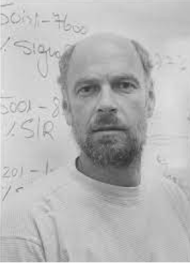
Dr. Yoav Citri
|
1953
-
1995
Yoav was born in Jerusalem on July 25, 1953. He performed his Ph.D. studies under the supervision of Prof. Michael Schramm at the Department of Biological Chemistry of the Hebrew University of Jerusalem. His research on analysis of the β3-adrenergic receptor led to the first functional reconstitution of a hormone receptor from its solubilized components. He received his Ph.D. degree in 1983 summa cum laude and was awarded the prestigious Kennedy Leigh Prize for the outstanding science graduate at the Hebrew University. Yoav's postdoctoral career was spent in two outstanding laboratories, that of Prof. David Baltimore at M.I.T. and of Prof. Michael Rosbash at Brandeis University. During this period, Yoav began to develop a deep interest in molecular neurobiology. His research focused on regulation of gene expression, in particular on characterizing expression of per, the Drosophila circadian rhythm gene.
He returned to Israel in 1987 as a Senior Scientist in the Department of Hormone Research at the Weizmann Institute, where he remained until his death in 1995. Yoav's major scientific focus was the brain; his dream was to exploit the power of molecular biology as a window into brain function. Armed with his exceptional graduate and postdoctoral training, and his formidable intellect and energy, he established a dynamic research group of talented students, postdocs, and technicians whom he directed in two major focus areas: What are the molecular mechanisms involved in the mammalian biological clock, and what mechanisms underlie brain plasticity? Yoav realized that in order to fully characterize the changes in gene expression pattern that presumably control these phenomena, it was essential to establish experimental paradigms that would provide improved sensitivity over conventional differential hybridization screening procedures. He concluded that it was essential to screen on a "clone by clone" basis, involving painstaking amplification of DNA from each clone, and had the courage to follow through on this idea, despite the enormous practical difficulties.
In retrospect, Yoav was clearly correct. The widely popular "gene hunts" now being performed extensively in academia and industry are based on the same principle, although the procedure has been greatly simplified by DNA chip technology, at that time not available to Yoav. After a prodigious team effort, Yoav and his colleagues were able to identify and characterize a large collection of genes, the candidate plasticity genes (CPGs), whose expression is modulated by treatment with the potent glutamate analog kainite. This collection includes genes with broadly diverse functions, consistent with the view that multiple molecular mechanisms underlie neuronal plasticity. Many of the genes identified are novel – their precise function and involvement in plasticity remain to be evaluated.
Yoav was an intensely passionate scientist. His attitude to research was uncompromising and his standards exacting. His recipe was simple yet profound: choose an issue to which you are deeply committed, no matter how difficult, and pursue it relentlessly, with all one's physical and intellectual resources. Yoav was a natural leader. He died in a car accident in 1995.

















